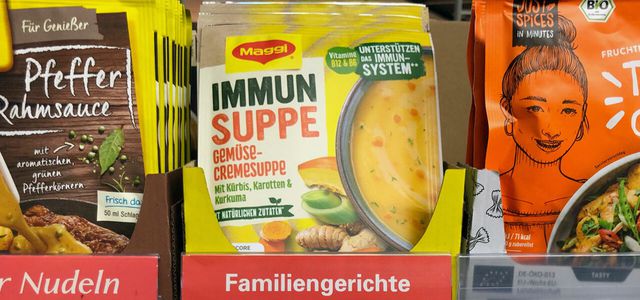
Especially in winter, many people are receptive to products such as the “Maggi immune soup”. But that is more appearance than reality, as our analysis shows.
The labels on the packet soups sound promising. The writing “Immunsuppe” immediately catches the eye. In addition, the pack advertises with vitamin B12, which is supposed to support the immune system, and with “natural ingredients”. There are three types of Maggi’s “immune soup”:
- “Chicken noodle soup with carrots, turmeric and ginger”
- “Vegetable cream soup with pumpkin, carrots and turmeric”
- “Cauliflower broccoli with turmeric, spinach and broccoli florets”
The vegetables and spices suggest that these are natural and healthy soups.
Ingredients of Maggis “immune soups”
If you look at the list of ingredients, however, you will notice: In the first places are ingredients such as durum wheat semolina, potato starch, starch or wheat flour – they are not necessarily known for their variety of vitamins and minerals. In all “immune soups” even the salt comes before the individual vegetables (with the exception of potatoes in one product). The different types of vegetables do not exceed a few percent each. A homemade one vegetable soup quickly comes up with a lot more vegetables.
How healthy are Maggi’s “immune soups”?

One can only speculate about the health value of Maggi’s “immune soups”. However, there is some evidence that the soups are not as healthy as they would suggest.
Basically, the health promise of the “immune soups” is based on the fact that vitamin B12 is added. In fact, manufacturers are allowed to Vitamin B12 Apply with the statement “contributes to the normal function of the immune system” if it contains enough usable vitamin B12. In the case of Maggi’s “immune soups”, this sentence is written in small letters at the bottom of the pack. The bold print “supports the immune system”, on the other hand, is the first thing that catches the eye and sounds much stronger than the legally permitted formulation.
That being said, the human immune system needs a lot more nutrients – for example, vitamins C and A, as well as some Trace elements. With the above-mentioned ingredients, it is doubtful whether the soup also provides these substances in significant quantities.
In any case, most people in Germany are adequately supplied with vitamin B12 from their normal diet. Since the vitamin is only found in relevant quantities in animal products, deficiencies mainly affect vegans and vegetarians. Vegans: Inside, however, Maggi’s “immune soups” have no use, as they are not vegan.
Finally there are the spices. In particular turmeric is on the front of all packaging. The colorful spice is considered by some to be a panacea and accordingly makes the “immune soups” look healthy. However, to date there are no meaningful clinical studies that certify the health-promoting effects of turmeric in humans. Also at ginger a positive effect on the immune system can only be assumed, but not proven.
Further arguments against Maggi’s “immune soups”

Apart from the health aspects, there are other reasons why the “immune soups” from Maggi are not recommended:
- The small bags cause a lot of packaging waste.
- The current price of the “immune soup” at Rewe, for example, is 1.19 euros. In the case of the “immune soups”, you get two plates of 60 to 70 calories each. You can cook much more nutritious dishes for a similar amount of money from cheap and healthy winter vegetables such as pumpkin or carrots.
- The soups are not certified organic. This is particularly critical with animal products, as conventional animal husbandry is often anything but species-appropriate. Here you can find out more about why organic labels are important for animal products: Bio-Siegel in comparison: What do animals get from organic animal husbandry? In the case of herbal products, too, those with the organic seal are preferable – among other things, because in the organic farming no synthetic chemical pesticides are allowed.
- Maggi is part of Nestlé. The large corporation is repeatedly criticized for various reasons.
A few articles on Nestlé’s practices:
- Video tip: 5 lousy stitches from Nestlé
- Nestlé pumps water out of California without permission – despite the drought
- Internal document: Nestlé rates over half of its products as unhealthy
- Nestlé is in trouble again over baby milk
Healthy and tasty alternatives to Maggi’s “immune soups”
So there are many reasons to leave Maggi’s “immune soups” on the supermarket shelves and cook them yourself instead. Even in winter there are a few fresh vegetables and various Tubers and roots from storage. Many delicious dishes can be prepared from this, for example:
- Winter recipes: seasonal dishes that keep you warm
- 3 healthy winter smoothies that will keep you warm
- Seasonal spreads: 3 recipes with regional winter vegetables
- Winter salad: recipes with ingredients from the season
- Pea stew: easy recipe for fall and winter
- Kale Salad: A vitamin-rich salad for the winter
- Pumpkin recipes: 4 delicious ideas for autumn
- Beetroot soup: basic recipe and delicious variations
- Prepare kale: this is how it tastes guaranteed
Check out another article for more useful tips: More than cabbage and beets: eat right regionally in winter
Read more on Techzle.com:
- Nestlé brands: These products belong to the company
- Preventing a cold: this is how you stay healthy
- Convenience Food: These are better alternatives